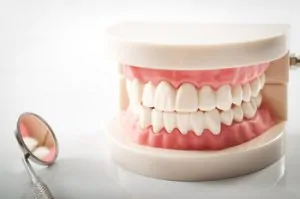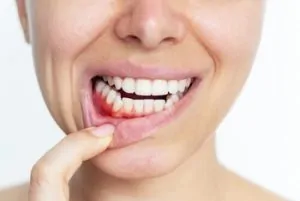Have you ever wondered, ‘Why is my mouth dry even though I drink a lot of water? ‘ You’re certainly not alone. Plenty of Australians deal with persistently dry mouths even when they stay well hydrated. This can be both frustrating and uncomfortable, affecting more than just your thirst; it can also impact your oral health, comfort, and general well-being.
Suppose you’ve been guzzling glasses of water yet still feeling that irritating dry feeling in your mouth; you might be wondering what’s really going on. Let’s explore the causes, symptoms, and practical remedies for dry mouth so you can get your saliva flowing again and maintain good oral health.
A Closer Look at Dry Mouth: What Is It, Really?
Dry mouth, or xerostomia in medical terms, occurs when the salivary glands don’t produce sufficient saliva to keep your mouth comfortably moist. Saliva plays an essential role in your body. It helps with chewing and swallowing, neutralises acids, removes food particles, protects against tooth decay, and maintains a healthy balance of bacteria in the mouth. When your mouth becomes dry, these important functions get disrupted.
Dry mouth symptoms might include:
- A sticky, dry feeling
- Difficulty chewing or swallowing
- Cracked lips
- Burning sensation in the mouth
- Rough tongue
- Bad breath
- Dry throat or sore throat
- Mouth sores
- Changes in taste
- Increased thirst
Even if you drink plenty of water, dry mouth can persist because the root cause is usually not dehydration alone but a problem with saliva production.
Why Does My Mouth Feel Dry Even When I’m Drinking Plenty of Water?
There are several possible answers if you’re wondering why your mouth feels like a desert even with litres of water going down. Here are some of the most common causes of dry mouth that water alone can’t fix:
1. Medications Can Mess With Your Saliva
One of the most common reasons for a persistently dry mouth is medication. Hundreds of prescription and over-the-counter medicines can reduce saliva flow, including:
- Antidepressants
- Blood pressure medications
- Antihistamines
- Decongestants
- Painkillers
- Certain medications used for anxiety
Talk to your doctor if you started a new medication and noticed your mouth becoming dry. They might be able to offer an alternative or advise you on how to handle the side effects.
2. Medical Conditions That Cause Dry Mouth
Certain underlying medical conditions can interfere with saliva production:
- Diabetes
- Sjögren’s syndrome (an autoimmune disorder that affects the tear glands and salivary glands)
- Parkinson’s disease
- Stroke
- Alzheimer’s disease
- HIV/AIDS
These conditions may affect the nerves and glands responsible for keeping your mouth moist. If you have one of these conditions, managing your dry mouth might require a tailored medical approach.
3. Radiation Treatment in the Head and Neck Region
If you’ve undergone cancer treatment with radiation therapy to the head and neck area, it can harm the salivary glands and result in long-lasting dry mouth. Radiation may reduce or stop saliva production, creating long-term discomfort.
4. Mouth Breathing or Nasal Congestion
Breathing through your mouth instead of your nose, whether because of allergies, nasal congestion, or the habit of sleeping with your mouth open, can dry out the delicate tissues inside your mouth. While water helps momentarily, the constant airflow through your mouth takes away moisture faster than you can replace it.
5. Ageing
As we age, salivary flow naturally declines. Many people with dry mouth are older adults, partly because they’re more likely to take multiple medications and have chronic conditions that affect saliva flow.
6. Chewing Tobacco and Alcohol
Chewing tobacco, smoking, and drinking alcohol are all known to cause dry mouth by interfering with normal saliva production and irritating the tissues in your mouth. Reducing or quitting these habits can help fix dry mouth problems over time.
7. Spicy or Salty Foods
Spicy or salty foods can make a dry mouth feel even worse by irritating the oral tissues. If you’re already struggling with reduced saliva flow, those foods might exaggerate the discomfort.
Why Saliva Is So Important
Saliva does far more than simply wetting your mouth. Here’s why you really want to keep your mouth moist and your saliva flowing:
- It helps you chew and swallow food
- It protects against tooth decay by washing away acids and sugars
- It supports good oral hygiene by controlling bacteria
- It prevents infections, mouth sores, and fungal infections
- It neutralises harmful acids
- It helps you speak comfortably
Without enough saliva, your risk of gum disease, tooth decay, and mouth infections goes up. That’s why treating dry mouth isn’t just about comfort; it’s about protecting your overall health.
Recognising the Other Symptoms of Dry Mouth
You might be surprised to learn that dry mouth can present with a wide range of symptoms beyond just a parched feeling. Some of the common symptoms include:
- Cracked lips
- Mouth sores
- Sore throat
- Bad breath
- Rough or dry tongue
- A burning sensation in the mouth
- Difficulty wearing dentures (they may feel loose or uncomfortable)
- Trouble tasting food
- Problems chewing or swallowing
- Repeated mouth infections
If you notice these symptoms alongside a persistently dry mouth, it’s worth investigating the underlying cause with your dentist or doctor.
How to Fix Dry Mouth: Tips That Work
So, what can you do to treat dry mouth? Drinking water is a great place to start, but it might not be enough. Here are some extra dry mouth remedies that can encourage saliva production and support a healthy mouth.
1. Chew Sugar-Free Gum
Chewing sugar-free gum is an effortless way to encourage saliva production. It helps activate the salivary glands, prompting them to release more saliva. Look for gum sweetened with xylitol, which can also help protect against tooth decay.
2. Suck on Sugar-Free Lozenges
Just like sugar-free gum, lozenges, or mints can encourage more saliva to flow. Make sure they are sugar-free to avoid promoting cavities.
3. Use an Artificial Saliva Substitute
Pharmacies stock saliva substitutes and artificial saliva products designed to lubricate your mouth when your body isn’t making enough saliva on its own. These can be a big help, especially if your dry mouth is related to medical treatments.
4. Adjust Your Diet
It’s best to avoid spicy or salty foods, since they may aggravate an already dry mouth. You might also steer clear of caffeine and alcohol, which can worsen dryness. Choose moist, soft foods instead.
5. Try Ice Cubes
Sucking on ice cubes or crushed ice can give short-term relief by moistening your mouth and helping with that dry feeling.
6. Improve Oral Hygiene
Keeping up with good oral hygiene is especially important when dealing with a dry mouth. Make sure to brush your teeth twice daily with fluoride toothpaste, floss each day, and visit your dentist regularly for check-ups. Since a dry mouth can increase your chances of tooth decay and gum disease, consistent dental care becomes even more vital.
7. Sip Water Throughout the Day
Rather than consuming large amounts of water all at once, try taking frequent small sips throughout the day. This can help keep your mouth consistently moist.
8. Humidify Your Home
Especially if you have nasal congestion or mouth breathing, running a humidifier at night can reduce mouth dryness.
9. Breathe Through Your Nose
If nasal congestion is forcing you to breathe through your mouth, see your doctor about ways to keep your nose clear. Breathing through your nose helps preserve saliva and protect the delicate tissues of your mouth.
10. Review Your Medications
If you think your medication might be contributing to your dry mouth, have a chat with your doctor. They might be able to change your prescription or lower the dose to ease your symptoms.
When to See a Professional About Dry Mouth
Sometimes, dry mouth can be a warning sign of more serious underlying health conditions. You should see your dentist or doctor if you have:
- Persistent, severe dry mouth
- Difficulty swallowing
- Unexplained weight loss
- Mouth sores that do not heal
- Ongoing bad breath
- Fungal infection symptoms, such as white patches in your mouth
These might be linked to conditions such as diabetes, autoimmune disease, or an issue with your salivary gland function. A professional can help you get to the bottom of the problem and suggest a treatment plan.
Preventing Dry Mouth and Protecting Your Smile
Once you get your dry mouth under control, you’ll want to prevent it from coming back. Here’s how to keep your mouth moist and your oral health on track:
- Drink water regularly, and sip rather than gulp
- Chew sugarless gum or sugar-free lozenges
- Avoid alcohol, caffeine, and smoking
- Keep up with dental checkups
- Brush twice daily and floss
- Use a fluoride mouthwash if your dentist suggests it
- Consider a humidifier in your bedroom
- Eat a well-balanced diet that includes plenty of fresh fruits and vegetables
- Manage any chronic health conditions carefully
These steps can help you maintain enough saliva to support chewing, swallowing, speaking, and fighting off bacteria.
The Connection Between Dry Mouth and Your Dental Health
It’s easy to overlook how much saliva helps protect your teeth. Without saliva, acids and bacteria can thrive, leading to:
- Tooth decay
- Gum disease
- Oral infections
- Bad breath
A persistently dry mouth is not something to ignore. Saliva is a true hero for your teeth and gums, and keeping saliva flowing is essential for long-term oral health.
Living Well with a Dry Mouth
While it might feel discouraging to have a mouth that stays dry even after you drink lots of water, remember that there are effective ways to manage and treat dry mouth. Whether it’s chewing sugar-free gum, improving oral hygiene, using artificial saliva products, or working with your doctor to adjust medication, there is help available.
You do not have to live with cracked lips, mouth sores, or the constant discomfort of a dry tongue. Addressing the cause of reduced saliva flow and making lifestyle adjustments can dramatically improve your comfort and your confidence.
Final Thoughts: Keep Asking Questions
If you’ve been asking why is my mouth dry even though I drink a lot of water, keep digging. Your body is trying to tell you something, and it deserves attention. A dry mouth is more than a nuisance; it can be a clue about your general health.
Speak with your dentist if dry mouth is disrupting your quality of life. Together, you can find ways to fix your dry mouth and protect your smile for years to come.
If you need more support with a dry mouth, contact Good Choice Dental at (02) 8203 8760 for personalised advice. They can guide you with tailored solutions to keep your mouth healthy, comfortable, and happy.
References
- FDI World Dental Federation. (n.d.). How to practise good oral hygiene. Retrieved from https://www.fdiworlddental.org/how-practice-good-oral-hygiene
- Mayo Clinic. (n.d.). Sjögren’s syndrome: Symptoms and causes. Retrieved from https://www.mayoclinic.org/diseases-conditions/sjogrens-syndrome/symptoms-causes/syc-20353216
- Cleveland Clinic. (n.d.). Dry mouth (xerostomia). Retrieved from https://my.clevelandclinic.org/health/diseases/10902-dry-mouth-xerostomia
- Oral Health Foundation. (n.d.). Sugar-free chewing gum. Retrieved from https://www.dentalhealth.org/sugar-free-chewing-gum






Recent Comments